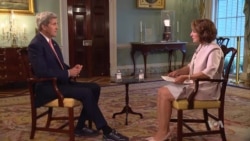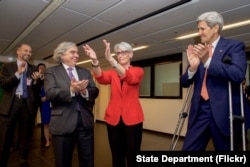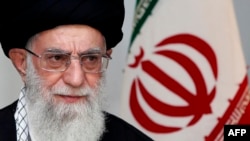U.S. Secretary of State John Kerry says implementing the international nuclear deal with Iran will make the world safer, improve the standard of living for Iranians and potentially open up other opportunities between the United States and Iran.
In an interview with VOA's Persian service, Kerry said he hopes proponents will successfully persuade people that the agreement will keep Iran from getting a nuclear weapon, prevent conflict and provide security for the region.
He has been meeting with members of Congress and said he will "tell the truth about the deal" during the 60 days lawmakers have to review the agreement. Kerry said he thinks they will see the benefits, and that he is glad to have two months for a thorough review.
"I think it will give time for people to really reflect and see that if you don't let this agreement go forward, you could be choosing [between] conflict and war. That could be the alternative," he said.
Congressional action
Congress can approve the terms or reject them and refuse to lift congressionally imposed sanctions. U.S. President Barack Obama has said he would veto any rejection measure.
Iranian Foreign Minister Mohammad Javad Zarif, Kerry's key counterpart in the long-running negotiations that ended last week with the landmark deal to limit Iran's nuclear program in exchange for sanctions relief, submitted the document Tuesday to lawmakers in the Iranian Majlis [parliament].
Talks too narrow?
Some critics of the nuclear talks say the United States should have pushed for an expanded agenda including human-rights issues, democratic reforms and freedom for several Americans detained in Iran.
Kerry said the state of the Iranian nuclear program meant that had to be a priority, but that the U.S. "will never stop believing in democracy and in people's rights." He also pledged the government will never stop raising the issue of the Americans being held.
"But this deal needed to get the nuclear issue off the table because we were threatened with the possibility of a nuclear arms race in the entire region, and nobody benefits from that," Kerry said.
"So we took a priority. We focused on the priority," he said. "We eliminated the potential of conflict over the nuclear weapons providing it is accepted by Congress, accepted by the Majlis and implemented. If that happens, I think the world will be a safer place."
UN resolution
The United Nations Security Council unanimously adopted a resolution Monday approving the nuclear agreement.
Looking ahead, Kerry said it would be another "six months or so" before any effects of lifting sanctions against Iran are felt. There is also the need to get past the congressional review period, which runs through mid-September, and for Iran and the International Atomic Energy Agency (IAEA) to resolve questions about the Iranian nuclear program by late December.
"If the deal goes through and is fully implemented, the people of Iran are going to see an improved standard of living, they'll see sanctions lifted off of them that have prevented commerce, trade, travel, investments - all these things," Kerry said.
Khamenei comments discussed
Kerry also discussed the comments made Saturday by Iranian Supreme Leader Ayatollah Khamenei, who said the nuclear deal does not signal cooperation with the U.S. on other issues and that Iran will never bow to what he called "the enemy's excessive demands."
Kerry called the statement "pretty negative and pretty dramatic," but said he remains an optimist about global affairs.
"For the moment, that's not what we're focused on," he said. "We're focused on the nuclear deal, and we will do what we have to do to push back against other activities if we think they interfere with the security of our friends or with our security."
However, with a number of crises facing the world, Kerry also said diplomats do not have the luxury of focusing on one issue without doing anything about others.
"You can't ignore what's happening in Syria, you can't ignore what's happening in Iraq, or what's happening in Yemen, or what's happening in Egypt or in the Sinai," he said.
"All of these issues compound themselves, and so we [who are] involved in public life and in diplomacy in today's world have a very complicated mosaic that we're trying to put together," Kerry said.
He said putting the pieces together is not easy, but that those issues would be resolved with agreements like the one that the United States, Britain, China, France, Russia and Germany reached with Iran.
"But we have to fight for it," Kerry said.
Chris Hannas contributed to this report








